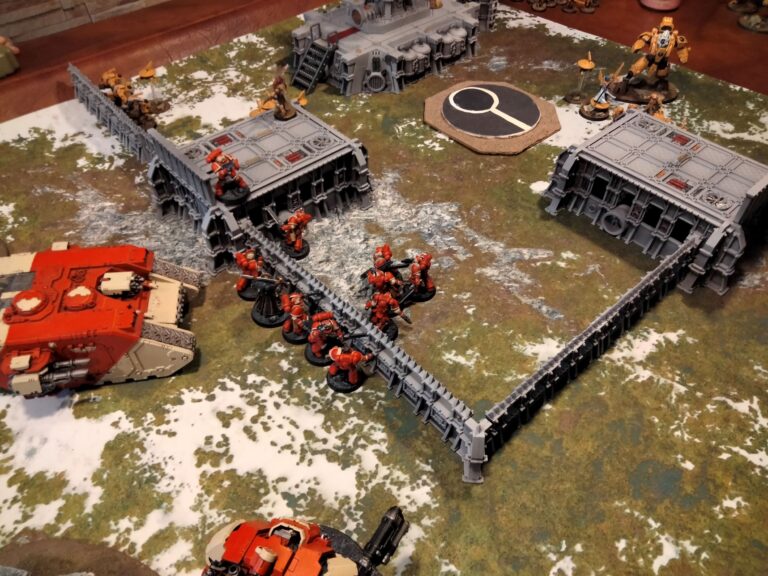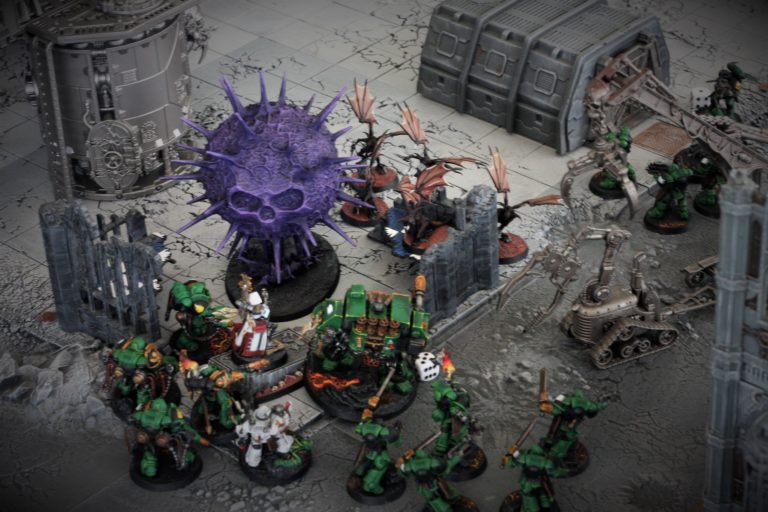Hosting at Home
I know what you’re thinking: this is a stretch. He’s really scraping the bottom of the barrel for content; this has been done before; I’ve had a game at home before, there’s nothing new I can learn. Maybe you’re right, maybe I’m just retreading old ground and you, dear reader, are the perfect, impeccable host and have nothing to gain from reading this. That’s perfectly fine.
But you can’t stop me from writing it.

Home Sweet Home
Personally, I think playing at home is infinitely better than playing in a store: there’s no closing time, you can eat and/or imbibe to your heart’s content, there are no rowdy jerks at the next table (or you can be the rowdy jerks and blast some Black Sabbath). Of course, you may not have space or terrain at your home to host (especially if you want to host a game day with lots of people), or you don’t know your opponent very well and don’t feel comfortable inviting them into your home.
Of course, hosting at your home is the same as having guests and you should tidy and clean before having guests. Again, I know that sounds obvious, but I’ve been to more than one roleplaying game where the host didn’t bother to do something as simple as empty a litter box, let alone clean. So I’m saying it: clean before your guest arrives. By the same token, check with your spouse/roommates/parents that having a guest for a multi-hour game isn’t going to conflict with anything else going on. Again, hopefully you’re not learning about common courtesy for the first time from a gaming blog, but, just in case, I’ve said it.
As host, you should also get everything ready ahead of time. Select the mission ahead of time (if you’re using a deck to generate the mission, generate it ahead of time, probably giving your opponent the chance to veto and redraw a card they don’t like). Setup the board and terrain, mark out deployment zones, and have your own army, books, and dice ready to minimise any pregame dithering about. If you’re playing in a dim room, bring in lights: my old gaming room was fairly small with no overhead light and I always brought in extra lamps before having a game in there.
Having a few materials on hand if you host a lot is also handy. I use cheap trays from the dollar store to organise hobby projects, and have spares to lend players to organise their armies. Knowing where you keep your spare measuring tape is helpful knowledge, and I keep a cup of dice on hand for anyone who forgets theirs. Most of these are retired due to bad luck, have nearly inscrutable symbols I bought on a whim, or ones I found on the floor after an event. Hey, if someone doesn’t like them, they should’ve remembered their own.

Making it fancy
The people in my gaming group are adults—adults who play with toy soldiers, but allegedly adults. We have jobs, families, responsibilities. Gaming is a nice escape from real life and making it an event goes a long way. If you’re hosting, your opponent is also saving you time and gas money/transit fare by showing up, so you should make it worth their while.
Writing a custom mission or selecting an interesting scenario is a good place to start (and this goes along with talking to your opponent ahead of time and prepping as above), or going so far as to build and paint new terrain just for that game.
Be a good host and have some drinks and snacks on hand, especially if you’re planning on multiple games or a big one that’ll take most of the day. And, conversely, if you’re going to someone’s house, don’t come empty handed, bring a six-pack or some donuts! Just look at all this effort they’re putting in to hosting you!
For snacks, make sure you have plates and napkins/paper towels on hand, especially if it’s something greasy or dusty: no one wants Cheetos cheese all over their figs. Also, finding out any dietary restrictions of your guests ahead of time is hugely important. And having something with caffeine is always a plus, especially if you’re starting early or going late (or if I’m coming).
If you’re going to be gaming over a regular meal time, it’s a good idea to plan for this. I’m a big fan of food that you can eat while playing and won’t slow down the game. Food you can prep ahead of time is ideal, or ordering in. Pizza is always a good call, specifically ‘cause you don’t need cutlery and it’s easy enough to eat while standing at the game table. But having a healthier option (especially if you’re planning a gaming weekend where you probably don’t want to spend consecutive meals eating junk food) is important too.
Obviously, you don’t need to break the bank and there’s nothing wrong with asking your opponent to split the cost (and if you’re the guest, you should be offering to). But if you’re not on a budget, there’s no reason not to go fancy and make it a memorable day with a tasty meal.
The Best Damn Boards in 40k
This brings me to my group’s secret weapon for gaming: the charcuterie board. It can be prepared ahead of time, it doesn’t slow down the game, you can load it with a wide variety of options to suit anyone’s wants and needs, and, best of all, it’s delicious. Couple a plate of meats, cheeses, and crackers with a veggie tray and some dips and your guests will be thinking this is the raddest ball they’ve ever attended (lack of formal attire notwithstanding).
Now, you may be thinking, was this whole article just a setup to share a gallery of food photos? Again: try and stop me.
Getting it right
Playing at home should be the exact opposite of the terrible pickup game you had against that angsty opponent at your FLGS. There’s very little reason why you shouldn’t elevate your game and strive for it to be a platinum gaming experience for you and your opponent.
And if you have your own tips and/or food photos, we’d love to see them. Please direct all food pics to contactus@wrongsideodthemaelstrom.com